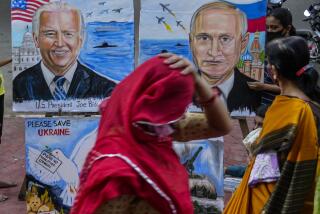India’s diplomatic ties with Afghanistan worry Pakistan
- Share via
Reporting from Kabul, Afghanistan — With a high-profile political visit and a promise of more aid, India moved Thursday to cement its ties with the government of Afghan President Hamid Karzai — overtures that are all but certain to raise hackles in Pakistan, which has long sought to limit Indian influence here.
At a time when the regional balance of power has been roiled by the killing of Osama bin Laden in his Pakistani hideaway by U.S. forces, India’s visiting Prime Minister Manmohan Singh also lent support to the Karzai government’s efforts to strike a peace deal with the Taliban, the Islamist movement that Pakistan helped create and nurture.
During Singh’s visit, India pledged an additional $500 million in assistance to Afghanistan, a 30% increase over the $1.5 billion in aid it already has provided for a variety of projects, many of them major infrastructure undertakings such as building roads and hospitals.
Pakistan has long voiced suspicion over India’s aid to Afghanistan and its well-entrenched diplomatic presence in the form of consulates across the country. Seemingly mindful of that, Singh and Karzai declared in a joint statement that their strategic partnership was “not directed against any other state or group of states.”
Both New Delhi and Kabul have accused Pakistan of fomenting terrorism against them — most notably the 2008 attack on the Indian city of Mumbai and the havens inside Pakistan utilized by insurgent groups battling the Karzai government and Western troops in Afghanistan. Then India Embassy in the Afghan capital has been struck twice in recent years by bombings blamed on Pakistan-based insurgents.
In public statements, Karzai and Singh kept the emphasis on their own alliance, refraining from mentioning the tensions with Islamabad. Singh, in a speech to a gathering in Kabul that included senior Afghan government officials, described India as “your neighbor and partner in development.”
The Karzai government, keenly aware even before Bin Laden’s killing of the planned drawdown of Western troops and the transfer of security responsibilities to Afghan forces by 2014, has been seeking to strengthen alliances with regional powers such as China and India. However, Pakistan will probably play a crucial role in any peace accord with the Taliban and other insurgent groups.
Karzai has made “reconciliation” the centerpiece of his second term in office. Preliminary contacts have not yet yielded any public statement of willingness by the Taliban to enter into talks, but the Afghan government and its Western backers hope the death of Bin Laden — who was sheltered by the Taliban in the wake of the Sept. 11, 2001, attacks — might provide an opening for negotiations to take place.
Also Thursday, NATO’s International Security Assistance Force announced the deaths of two service members in what it described as a “shooting incident” in southern Afghanistan. The language suggested the possibility of a case of friendly fire, perhaps involving the Afghan security forces, because firefights with the Taliban or other militants are usually described explicitly as such.
Western military officials declined to provide any details about the deaths, including the nationalities of those who were killed.
More to Read
Sign up for Essential California
The most important California stories and recommendations in your inbox every morning.
You may occasionally receive promotional content from the Los Angeles Times.













